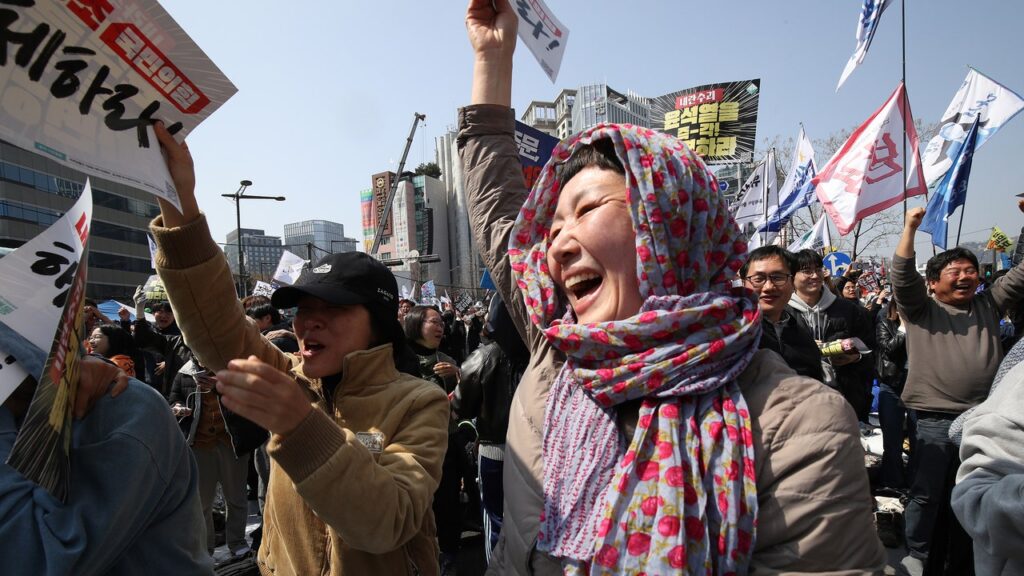South Korea’s Constitutional Court upheld the impeachment of the country’s President, removing him from office. E. Tammy Kim, who covered Yoon Suk-yeol’s brief declaration of martial law, in December, and the protests that followed, reflects on the challenges to democracy in Korea and the United States. Also in today’s newsletter:
Protesters opposed to impeached South Korean president Yoon Suk Yeol react after hearing the Constitutional Court’s verdict on April 04, 2025 in Seoul, South Korea.Photograph by Chung Sung-Jun / Getty
E. Tammy Kim
Kim writes about politics, the federal government, and the Koreas.
While working on Deep State Diaries, my weekly dispatch about the Trump Administration’s attacks on the federal workforce, I’ve kept my eye on another democracy in crisis: South Korea.
In December, President Yoon Suk-yeol had attempted to thwart the country’s National Assembly, which was obstructing his agenda, by declaring martial law. He censored the media and banned large gatherings; he ordered troops and police to arrest opposition leaders and a leftist journalist. Shoot, if necessary, he demanded. As I wrote at the time, there could have been a massacre—a return to South Korea’s violent, pre-democratic past. (The country was ruled by military dictators from 1961 to 1987.) But the soldiers disobeyed, legislators pushed past guns to vote down the declaration, and thousands of protesters filled the streets. Within six hours, Yoon was forced to call off his plan.
Mass protests continued throughout the winter, calling for Yoon’s arrest and prosecution. He was eventually impeached and indicted for crimes against the state. It was a meaningful step for a relatively new democracy, I wrote. But impeachment does not automatically lead to removal from office. That would be up to the nation’s Constitutional Court, which deliberated for two and a half months. On Friday morning, the justices ruled unanimously (8–0) in favor of Yoon’s ouster. An election for a new President must now be held within sixty days.
I watched Friday’s proceedings on Korean TV: inside the courtroom, there was a quiet, bloodless recitation of treasonous acts; outside, a rowdy explosion of signs, costumes (a giant bear, a red-hatted Mario), song, and dance. Yoon was holed up in his house, where he has long been keeping out of public view. “You, the Korean people, have been through so much,” the head of the impeachment committee for the National Assembly said. He—all the speakers were men, despite the strong presence of young women in the protest movement—invoked a metaphor of rebirth: a “new, democratic spring” was here.
Shortly after the proceedings, workers took down the Presidential flag from Yoon’s official headquarters. Only the national Taegukgi flag remained. There had been a sense, in the lead-up to the court’s announcement, that removing Yoon from office would be a victory for democracy at large. South Koreans needed the win. The rest of us did, too.
More Top Stories
Daily Cartoon
More Fun & Games
P.S. Dr. Martin Luther King, Jr., was assassinated on this day in 1968. “His death is difficult for us because it deprives us of the embodiment of the cause he represented for all Americans,” Jacob R. Brackman, Terrence Malick, and Renata Adler wrote at the time. “The more difficult because of the threat inherent in that deprivation.”
Premium IPTV Experience with line4k
Experience the ultimate entertainment with our premium IPTV service. Watch your favorite channels, movies, and sports events in stunning 4K quality. Enjoy seamless streaming with zero buffering and access to over 10,000+ channels worldwide.

















